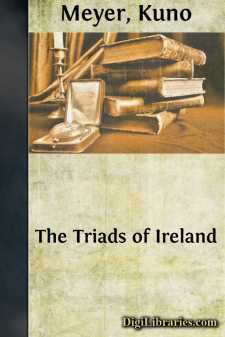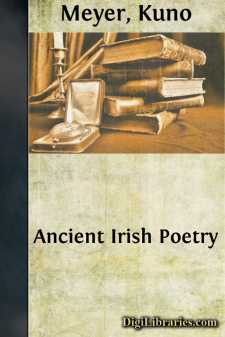Categories
- Antiques & Collectibles 13
- Architecture 36
- Art 48
- Bibles 22
- Biography & Autobiography 813
- Body, Mind & Spirit 142
- Business & Economics 28
- Children's Books 16
- Children's Fiction 13
- Computers 4
- Cooking 94
- Crafts & Hobbies 4
- Drama 346
- Education 46
- Family & Relationships 57
- Fiction 11829
- Games 19
- Gardening 17
- Health & Fitness 34
- History 1377
- House & Home 1
- Humor 147
- Juvenile Fiction 1873
- Juvenile Nonfiction 202
- Language Arts & Disciplines 88
- Law 16
- Literary Collections 686
- Literary Criticism 179
- Mathematics 13
- Medical 41
- Music 40
- Nature 179
- Non-Classifiable 1768
- Performing Arts 7
- Periodicals 1453
- Philosophy 64
- Photography 2
- Poetry 896
- Political Science 203
- Psychology 42
- Reference 154
- Religion 513
- Science 126
- Self-Help 84
- Social Science 81
- Sports & Recreation 34
- Study Aids 3
- Technology & Engineering 59
- Transportation 23
- Travel 463
- True Crime 29
Kuno Meyer
Kuno Meyer (1858–1919) was a German scholar and Celticist, known for his significant contributions to the study of early Irish literature and language. He was instrumental in introducing Irish texts to a wider audience, translating and editing works such as "The Vision of MacConglinne" and "The Voyage of Bran". Meyer also founded the journal "Zeitschrift für celtische Philologie" and promoted the study of Celtic languages across Europe. His research had a lasting impact on the preservation and understanding of medieval Irish culture.
Author's Books:
Sort by:
by:
Kuno Meyer
PREFACE The collection of Irish Triads, which is here edited and translated for the first time, has come down to us in the following nine manuscripts, dating from the fourteenth to the nineteenth century:— L, i.e. the Yellow Book of Lecan, a vellum of the end of the fourteenth century, pp. 414b—418a, a complete copy. B, i.e. the Book of Ballymote, a vellum of the end of the fourteenth century, pp....
more...
by:
Kuno Meyer
INTRODUCTION In offering this collection of translations from early Irish poetry to a wider public I feel that I am expected to give a brief account of the literature from which they are taken—a literature so little known that its very existence has been doubted or denied by some, while others, who had the misfortune to make its acquaintance in ill-chosen or inadequate renderings, have refused to...
more...



